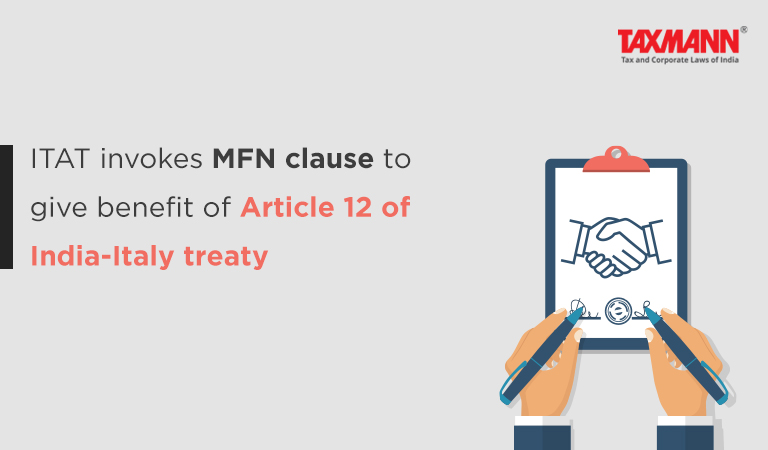ITAT invokes MFN clause to give benefit of Article 12 of India-Italy treaty
- Blog|News|Income Tax|
- 3 Min Read
- By Taxmann
- |
- Last Updated on 27 January, 2023

Case Details: Koninklijke Philips N.V v. DCIT - [2023] 146 taxmann.com 213 (Kolkata-Trib.)
Judiciary and Counsel Details
-
- Sonjoy Sarma, Judicial Member & Girish Agrawal, Accountant Member
- Ketan Ved, CA, for the Appellant.
- G.H. Sema, Addl. CIT for the Respondent.
Facts of the Case
Assessee-non-resident Company was incorporated as per the laws of the Netherlands. It was engaged in the areas of consumer electronics domestic appliances, components, and medical systems. The assessee filed its return of income for the year under which the refund was claimed
During the year, the Assessing Officer (AO) processed the return and granted a refund for the relevant year. However, he deducted tax from the interest component of the refund.
Aggrieved by the order, the assessee preferred an appeal to the CIT(A) but with no success.
The aggrieved assessee preferred an appeal to the Kolkata Tribunal.
ITAT Held
The Tribunal held that as per Protocol IV(2) of the India-Netherlands Treaty, the assessee is covered by the benefits of the Most Favoured Nation (MFN) clause. This protocol contains that if the provisions of a tax treaty between India and another OECD member country provide for measures that are more beneficial than with the Netherlands, the provisions of the treaty with such other country will apply to India-Netherlands Treaty.
As per the India-Italy treaty, interest earned by a resident of Italy will not be chargeable to tax if such interest is paid by the Government of India. India- Italy Treaty came into force in 1995 and Netherlands in 1989, i.e., after signing DTAA with the Netherlands.
Therefore, by virtue of the Protocol mentioned in the India-Netherlands treaty and the MFN clause, the provisions of the India-Italy treaty becomes available to the assessee as the India-Italy Treaty came into force after signing Treaty with the Netherlands.
In the instant case, interest on the income tax refund is a “debt claim” payable by the government to the assessee which is covered under article 12 of the India-Italy treaty. This interest is not chargeable to tax in India and thus no tax was required to be deducted.
Thus, the AO was directed to refund the tax deducted on the interest component of the Income tax refund
List of Cases Reviewed
-
- Ansaldo Energia SPA v. CIT (IT) [2016] 69 taxmann.com 369/240 Taxman 107/384 ITR 312 (Mad.)
- Steria (India) Ltd. v. CIT [2016] 72 taxmann.com 1/241 Taxman 268/386 ITR 390 (Delhi) (para 19.5) followed.
- DIT(IT) v. WNS Global Services (UK) Ltd. [2013] 32 taxmann.com 54/214 Taxman 317 (Bom.) (para 22.2) followed.
List of Cases Referred to
-
- Koninklijke Philips Electronics N.V. v. Dy. CIT (International Taxation) [2018] 99 taxmann.com 23 (Kol.-Trib) (para 5)
- Dy. CIT v. ITC Ltd. [2002] 82 ITD 239 (Kol.) (para 14)
- Steria (India) Ltd. v. CIT [2016] 72 taxmann.com 1/241 Taxman 268/386 ITR 390 (Delhi) (para 14)
- Concentrix Services Netherlands v. ITO(TDS) [2021] 127 taxmann.com 43/434 ITR 516 (Delhi) (para 14)
- Apollo Tyres Ltd. v. CIT(International Taxation) [2018] 92 taxmann.com 166 (Kar.) (para 14)
- Ansaldo Energia SPA v. CIT (International Taxation) [2016] 69 taxmann.com 369/240 Taxman 107/384 ITR 312 (Mad.) (para 16)
- Small Industries Development Bank of India v. Dy. CIT [IT Appeal No. 3707 (Mum.) of 2012, dated 15-9-2017] (para 20)
- DIT(International Taxation) v. WNS Global Services (UK) Ltd. [2013] 32 taxmann.com 54/214 Taxman 317 (Bom.) (para 22).
Disclaimer: The content/information published on the website is only for general information of the user and shall not be construed as legal advice. While the Taxmann has exercised reasonable efforts to ensure the veracity of information/content published, Taxmann shall be under no liability in any manner whatsoever for incorrect information, if any.

Taxmann Publications has a dedicated in-house Research & Editorial Team. This team consists of a team of Chartered Accountants, Company Secretaries, and Lawyers. This team works under the guidance and supervision of editor-in-chief Mr Rakesh Bhargava.
The Research and Editorial Team is responsible for developing reliable and accurate content for the readers. The team follows the six-sigma approach to achieve the benchmark of zero error in its publications and research platforms. The team ensures that the following publication guidelines are thoroughly followed while developing the content:
- The statutory material is obtained only from the authorized and reliable sources
- All the latest developments in the judicial and legislative fields are covered
- Prepare the analytical write-ups on current, controversial, and important issues to help the readers to understand the concept and its implications
- Every content published by Taxmann is complete, accurate and lucid
- All evidence-based statements are supported with proper reference to Section, Circular No., Notification No. or citations
- The golden rules of grammar, style and consistency are thoroughly followed
- Font and size that’s easy to read and remain consistent across all imprint and digital publications are applied



 CA | CS | CMA
CA | CS | CMA
